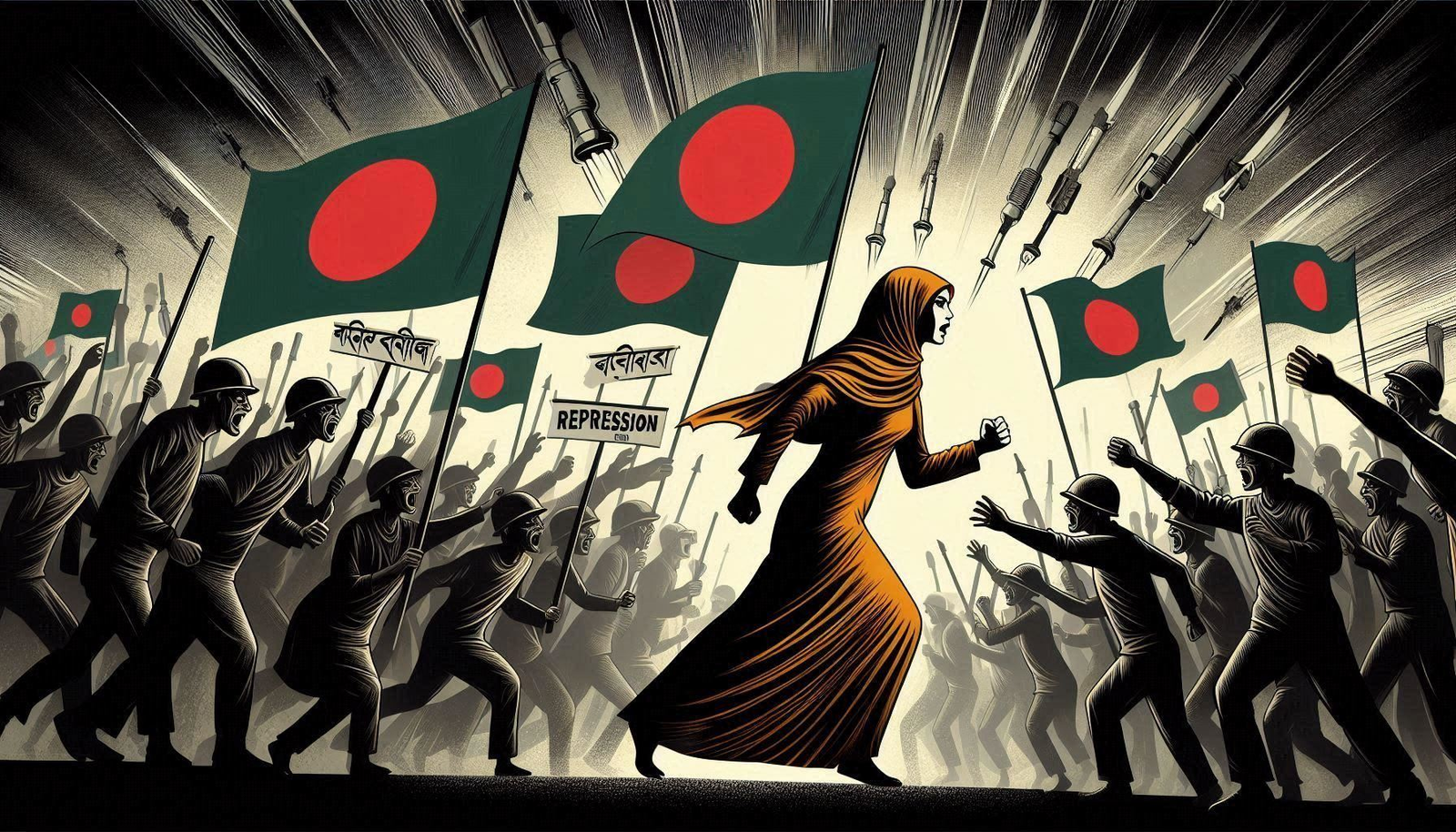
Abstract
In August 2024, Bangladesh witnessed a significant political upheaval marked by mass student protests, the resignation of Prime Minister Sheikh Hasina, and the subsequent takeover by the military. This research paper explores the human rights violations that occurred during this period, including extrajudicial killings, enforced disappearances, and the repression of free speech. The analysis also considers the potential for democratic reform following the resignation of Hasina, while highlighting the risks associated with military rule. Through this study, we aim to shed light on the underlying causes of these violations and propose pathways to justice and accountability.
Introduction
Bangladesh, a country with a history of political volatility, found itself at a crossroads in August 2024 when weeks of student-led protests culminated in the resignation of Prime Minister Sheikh Hasina. While her departure after nearly 15 years in power provided a glimmer of hope for democratic reform, it also underscored the grave human rights abuses that had occurred under her rule and during the protests that ultimately led to her ouster. This paper examines the nature and extent of these violations, focusing on the implications for Bangladesh’s future.
Background
Since Sheikh Hasina first came to power in 2009, her administration has been characterized by increasing authoritarianism. Her government has been accused of stifling dissent, curbing press freedoms, and using security forces to suppress opposition. The situation escalated in July 2024, when students began protesting against the reinstatement of a 30% job quota for descendants’ of 1971 independence war veterans. What started as a peaceful demonstration soon turned violent, with security forces and members of the ruling party’s student wing, the Chhatra League, clashing with protesters. The government’s response to the protests was swift and brutal. An estimated 300 people were killed, thousands were injured, and over 10,000 were arrested. Reports of extrajudicial killings and enforced disappearances added to the growing outrage against Hasina’s government, ultimately leading to her resignation on August 5, 2024. The military, led by Army Chief General Waker-Uz-Zaman, took control, promising justice and the formation of an interim government. However, this transition raises concerns about the potential for further human rights abuses under military rule. Violation of Human Rights During the Protests:
- Extrajudicial Killings
During the protests, security forces were accused of using excessive force against demonstrators. The use of live ammunition resulted in the deaths of at least 300 protesters, many of whom were students. These extrajudicial killings drew widespread condemnation from both domestic and international human rights organizations. The government ‘s refusal to acknowledge these deaths and the lack of accountability for the perpetrators further exacerbated the situation.
- Enforced Disappearances
Enforced disappearances became a hallmark of Sheikh Hasina’s rule, with over 600 cases reported since she took office in 2009. During the 2024 protests, the number of disappearances skyrocketed, with many protesters and opposition figures being detained without charge. Some were held in secret detention facilities, while others remain unaccounted for. The release of two prominent victims of enforced disappearance on August 5, 2024, after Hasina’s resignation, provided a small measure of relief, but the fate of many others remains unknown.
- Suppression of Free Speech
The Hasina government employed various legal mechanisms to suppress dissent, including the Digital Security Act, which allowed for the arrest and detention of journalists, activists, and ordinary citizens critical of the government. During the protests, internet access was shut down, and numerous individuals were detained for expressing support for the demonstrations online. This crackdown on free speech was indicative of the broader pattern of repression that characterized Hasina’s tenure.

The Role of the Military: Reform or Repression?
- Promises of Justice
Upon taking control, General Waker-Uz-Zaman pledged to bring justice to the victims of human rights abuses and to establish an interim government. While these promises have provided some hope for reform, the history of military rule in Bangladesh raises concerns. The last military-led caretaker government in 2007 initially enjoyed public support, but it soon descended into a regime marked by widespread abuses, including torture and restrictions on political participation.
- Potential for Further Abuses
The involvement of the military in Bangladesh’s political affairs has often led to the erosion of democratic norms. Under the declared state of emergency, the military has broad powers to detain individuals, limit freedoms, and suppress opposition. There is a real risk that the military’s current role could lead to a repeat of the abuses seen in 2007, particularly if the promised justice mechanisms are not transparent and independent.
Response from Domestic and International Communities
- Domestic Response
Within Bangladesh, civil society and human rights organizations have called for accountability for the abuses that occurred during the protests and under Hasina’s rule. However, these efforts have been met with significant challenges, including ongoing repression and the fear of retaliation. Despite these obstacles, there have been instances of solidarity, such as the protection of minority Hindu religious sites by activists in the wake of Hasina’s resignation.
- International Response
The international community, including the United Nations, has urged calm and called for a peaceful transition of power. Human Rights Watch and other organizations have emphasized the need for an independent inquiry intothe abuses that occurred during the protests and throughout Hasina’s time in office. Influential
- Enforced Disappearances
Enforced disappearances became a hallmark of Sheikh Hasina’s rule, with over 600 cases reported since she took office in 2009. During the 2024 protests, the number of disappearances skyrocketed, with many protesters and opposition figures being detained without charge. Some were held in secret detention facilities, while others remain unaccounted for. The release of two prominent victims of enforced disappearance on August 5, 2024, after Hasina’s resignation, provided a small measure of relief, but the fate of many others remains unknown.
- Suppression of Free Speech
The Hasina government employed various legal mechanisms to suppress dissent, including the Digital Security Act, which allowed for the arrest and detention of journalists, activists, and ordinary citizens critical of the government. During the protests, internet access was shut down, and numerous individuals were detained for expressing support for the demonstrations online. This crackdown on free speech was indicative of the broader pattern of repression that characterized Hasina’s tenure. governments have been encouraged to support efforts to ensure that Bangladesh does not repeat the mistakes of the past and that justice is served for the victims.
Recommendations
- Establishing Independent Justice Mechanisms
For Bangladesh to move forward, it is essential that the interim government establishes independent and transparent justice mechanisms to investigate the human rights abuses that occurred during the protests and under Hasina’s rule. This should include the involvement of international bodies, such as the United Nations, to ensure impartiality and accountability.
- Protecting Freedoms and Human Rights
The interim government must prioritize the protection of fundamental freedoms, including the rights to free speech, assembly, and association. Laws that have been used to suppress dissent, such as the Digital Security Act, should be repealed or reformed to align with international human rights standards.
- Preventing Retaliation and Violence
In the aftermath of Hasina’s resignation, there is a risk of violent retaliation against her supporters and minority communities. The authorities must take proactive measures to prevent such violence and ensure that all citizens are protected, regardless of their political or religious affiliations.
- Supporting Democratic Reform
Finally, the international community should support Bangladesh in its efforts to transition toa more democratic and just society. This includes providing technical assistance for elections, promoting the rule of law, and encouraging the development of independent institutions that can hold future governments accountable.
Conclusion
The events of August 2024 have brought Bangladesh to a critical juncture. While the resignation of Sheikh Hasina offers a chance for democratic reform, the country’s history of military involvement in politics raises concerns about the potential for further human rights abuses. It is crucial that both domestic and international actors work together to ensure that Bangladesh’s future is defined by justice, accountability, and respect for human rights, rather than a continuation of the repressive practices of the past.
References
- Human Rights Watch. (2024). Bangladesh: Mass Arrests, Killings During Protests.
- Amnesty International. (2024). Bangladesh: Internet Shutdowns and Arbitrary Detentions Must End.
- United Nations. (2024). UN Calls for Calm and Peaceful Transition in Bangladesh.
- The Dhaka Tribune. (2024). Military Pledges Justice After Hasina’s Resignation.
- The Guardian. (2024). Sheikh Hasina Resigns Amid Mass Protests in Bangladesh.



